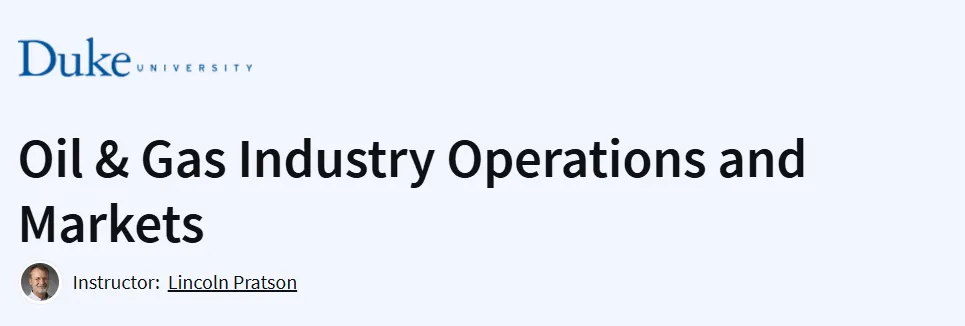What you will learn in Oil & Gas Industry Operations and Markets Course
- Oil & Gas Operations: Understand the core activities involved in bringing natural gas and petroleum products to market, including exploration, drilling, production, refining, and transportation.
- Market Dynamics: Learn about the factors that determine the prices of oil, gas, and petroleum products, including costs, supply and demand, and the role of reserves.
- Economic Impacts: Explore how the oil and gas industry influences global economies, policy decisions, and daily life.
Program Overview
Oil and Gas Operations and Technology
⏳ 3 hours
Overview of the oil and gas industry.
Exploration tools and methods.
Drilling processes and reservoir characteristics.
Production techniques and enhanced recovery methods.
Processing natural gas and crude oil.
Midstream operations and liquefied natural gas (LNG).
Oil and Gas Industry Markets
⏳ 4 hours
Cost components in oil and gas activities.
Price determination and elasticity.
Seasonal impacts on prices.
Types of oil and gas prices.
Reserves and their implications.
Future trends in the oil and gas industry.
Get certificate
Job Outlook
- Proficiency in oil and gas operations and markets is valuable for roles such as Energy Analyst, Petroleum Engineer, Supply Chain Manager, and Policy Advisor.
- Skills acquired in this course are applicable across various sectors, including energy consulting, government agencies, and multinational corporations.
- Completing this course can enhance your qualifications for positions that require a solid understanding of the oil and gas industry.
Specification: Oil & Gas Industry Operations and Markets
|
FAQs
- The course is designed for both beginners and professionals seeking industry insights.
- Basic understanding of business operations, energy markets, or chemistry helps but is not mandatory.
- Supplementary reading on industry terminology can aid comprehension.
- The course provides a structured overview of operations and markets to bring beginners up to speed.
- Provides foundational knowledge of upstream, midstream, and downstream operations.
- Useful for roles in energy analysis, operations, trading, and management.
- Industry certifications, internships, or field experience may still be needed for advanced roles.
- Completing the course demonstrates familiarity with key industry processes and market dynamics.
- Focuses on core operational and market concepts that remain relevant over time.
- Some contemporary technologies and sustainability practices are introduced conceptually.
- Learners should supplement with current industry reports for the latest innovations.
- The course prepares learners to understand and adapt to evolving industry developments.
- No advanced software skills are required; the course is largely conceptual.
- Familiarity with spreadsheets and basic data analysis helps interpret market trends.
- Some modules may discuss industry-standard tools conceptually, such as petroleum simulation or trading platforms.
- Practical implementation of tools can be explored outside the course for hands-on experience.
- Covers supply chain, pricing mechanisms, and factors affecting global oil and gas markets.
- Helps learners understand market forces such as demand, geopolitics, and regulations.
- Provides insights useful for energy analysts, traders, and strategic planners.
- Focuses on conceptual understanding rather than direct trading or financial modeling.





